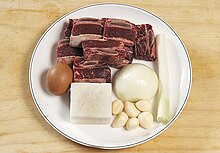| This article relies largely or entirely on a single source. Relevant discussion may be found on the talk page. Please help improve this article by introducing citations to additional sources. Find sources: "Ingredient" – news · newspapers · books · scholar · JSTOR (March 2008) |

In a general sense, an ingredient is a substance which forms part of a mixture. In cooking, recipes specify which ingredients are used to prepare a dish, and the term may also refer to a specific food item in relation to its use in different recipes. Many commercial products contain secret ingredients purported to make them better than competing products. In the pharmaceutical industry, an active ingredient is the ingredient in a formulation which invokes biological activity.

National laws usually require prepared food products to display a list of ingredients and specifically require that certain additives be listed. Law typically requires that ingredients be listed according to their relative weight within the product.
| This section needs expansion. You can help by adding to it. (April 2023) |
Etymology
From Middle French ingredient, from Latin ingredientem, present participle of ingredior ('to go or enter into or onto').
Artificial ingredient
An artificial ingredient usually refers to an ingredient which is artificial or human-made, such as:
- Artificial flavour
- Food additive
- Food colouring
- Preservative
- Sugar substitute, artificial sweetener
See also
References
- "Guidance for Industry: A Food Labeling Guide". Food and Drug Administration. April 2008. Retrieved 17 June 2015.